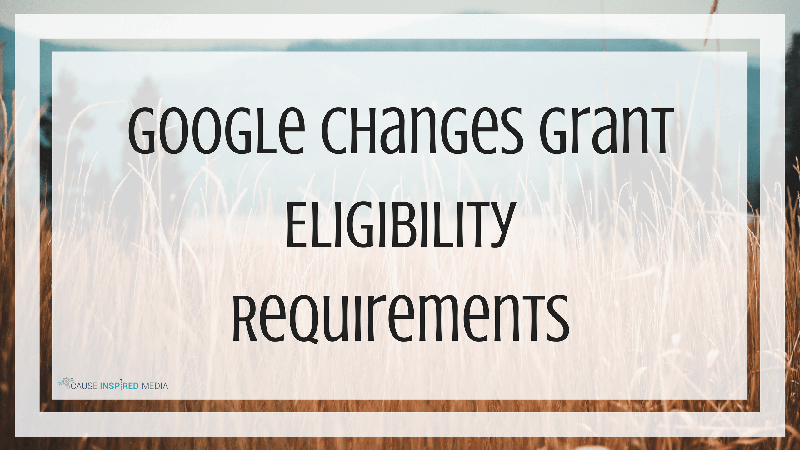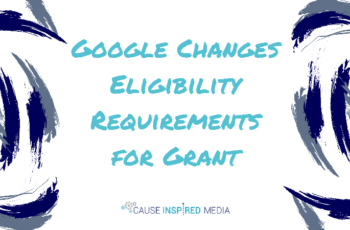Google Changes Grant Eligibility Requirements
Google has updated their Grant policies for the new year, effective January 1st, 2018. We have outlined the new policies that are most likely to impact your Google AdGrant Account. Take a look at some of these policy changes and feel free to contact your account Strategist with any questions.
The Google Ad Grant is one of the most valuable and underutilized tools that nonprofit organizations have. A $10,000 monthly advertising credit can go a long way if you know how to use it, and in our experience, we have found that most nonprofits and marketing agencies have trouble managing the grant effectively. Due to the specialized nature of the credit and Google’s evolving policies, anyone using this philanthropic advertising platform should be ingrained in the specifics of both the AdWords software, and the nuances of the nonprofit landscape and grant policies.
Just over a month ago, Google made the most sweeping changes to the Ad Grant program since they started in 2003. What are these changes? And how can you take advantage of this new competitive landscape?
Automatic Suspension for Discrimination: This has slowly been implemented already. Google has disapproved keywords and ads related to any discriminated groups regardless of if it is negative or positive. This change would mean that if Google finds you in violation they will suspend your entire account. Google has been under fire for some time now about allowing their advertising network to be used to promote everything from relatively harmless click-bait to actual violence. This new policy codifies Google’s anti-discrimination policies to be specific to the grant.
Mission-Based Campaigns: Technically, the grant has always required campaigns to be “mission-based,” however this new policy outlines exactly what that means. This means that you will not be able to use branded keywords that are not owned by your organization. Google uses “YouTube” as an example in their policy description. From experience, this has been a real problem for organizations that don’t understand the program and those participating in fraud. Additionally, Google wants organizations to be clear about their intent, and to only advertise for relevant services, products, and topics generally. So, with some exceptions, they don’t want nonprofits to bid on single words or “overly generic” keywords such as “free videos” or “news.”
Website Policy: This is not exceptionally different from before. This update simply outlines that your mission and services need to be clear from the content on your website. Google now requires that nonprofits own their own “high-quality” website with limited on-site ads. Commercial activity must also not be the sole purpose of the website. The major difference to this update is that Google has added actual context to these policies, implying that they intend to enforce them.
Performance Requirements: This, in addition to the new bidding option we will discuss later, is the most significant policy change by far. Previously, there weren’t mandatory performance requirements unless you had the (currently unavailable) Google Grant Pro. However, there are many nonprofits and agencies that simply do not keep up with their grant accounts, and consequentially have very low click-through-rates (CTRs). To combat this, Google has updated their policy so that nonprofits are required to maintain an overall CTR of 5%. This is a major change because, in their last update, Google stated (on the last version of their search exams) that anything above 1% is good.
Annual Survey: This new requirement is actually a step backwards in time. Grant accounts used to either have to reapply annually or, in the case of Pro accounts, answer a survey. Now all grant recipients have to answer a detailed survey by March of 2018 in order to maintain access to their grant. This will repeat annually from this point forward.
How Do I Take Advantage Of This?
1. Refine Your Targeting
Since grant accounts are now more limited in the topics and keywords that you can bid on, and require you to have a strong minimum performance, it is very important that you understand your audience and market to them effectively. AdWords has many options available, even in the somewhat limited Ad Grant accounts. Take advantage of all these features, extensions, and data in your account to improve performance and compete at a higher level.
2. Gather Data
Google’s new Ad Grants policies have given us all a dual reason to dive into our data and gather more of it. Whether you just want to maintain basic performance up to keep your grant active, or have a substantial goal and want to take advantage of the new Maximize conversion bidding, you will need data from your Analytics account or other tracking software.
3. Find a Partner
Unless you have an internal team with a strong background in digital marketing and free time on their hands, you will need a partner to stay up-to-date, much less thrive in this environment. Make sure that you have someone who not only is certified by Google to work in AdWords, but specializes in the way nonprofits operate and raise funds. Remember that not all traffic and partners are equal.
At Cause Inspired Media, we are accustomed to adjusting to Google’s policy changes on a regular basis. We want our clients to know that our team has the capabilities to effectively optimize each account despite any policies that may impact them. We are also very familiar with the new bidding type called Maximize Conversions, and have been testing it on grant accounts since September, as some of our clients were allowed in the beta program. This does not entirely remove the $2 limit, however it isn’t applied to campaigns running the new bidding type. We have found that in certain circumstances it is very effective, but this is not always the case across the board.
If you have any questions about Google’s policy changes, or want to have a better understanding of how your Google AdGrant account will be impacted, contact us!
By: Sean Kerr, Chief Operations Officer















